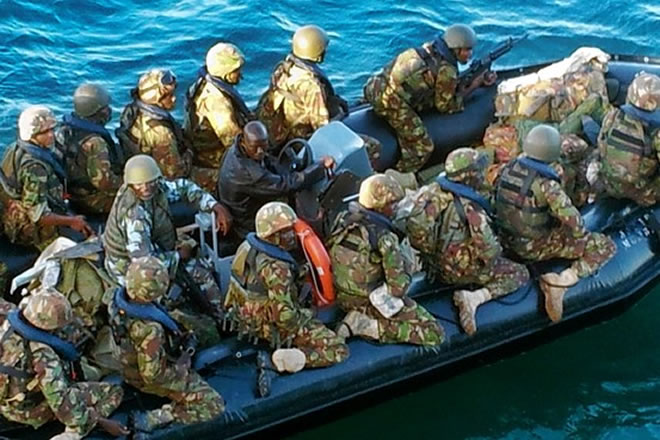
Kenya Ministry for Defense/Associated Press
Undated photo from Kenya's Defense Ministry is said to show troops preparing for assault on Somali port.

By NICHOLAS BARIYO in Kampala, Uganda and IDIL ABSHIR in Nairobi
Saturday, September 29, 2012
The African Union-backed drive appears to have surprised al Shabaab militants as well as residents of Kismayo who were hoping to flee before serious fighting began. Kenyan troops seized the city's port, according to the African Union Mission in Somalia, or Amisom. Other areas of control remained unclear. As of late Friday, al Shabaab continued to defend Kismayo, one of the militant group's few remaining sources of revenue.
"Some of the opposition have fled, and there are still some inside," said Col. Ali Aden Houmed, spokesman for Amisom. "We'll find them."
Al Shabaab fighters denied earlier reports they had ceded the city to Kenya's troops and allies of the African Union peacekeepers.
"Kismayo remains firmly in the hands of the Mujahideen," one al Shabaab fighter said in a Twitter statement. "Stay tuned for updates."
The battle over the port city of 180,000 people is part of a final push to eradicate extremist rebels who have been blamed for attacks inside and outside Somalia, and sought to undermine recent democratic gains in the troubled East African nation.
African Union peacekeepers—mainly from Uganda, Kenya, Burundi and Sierra Leone—have swept across much of Somalia in the past year, introducing a fragile peace to the long-chaotic capital, Mogadishu. The Somali Army and allied local militias have aided in this push. Earlier this month, Somalia's parliament voted in a president to head a new government that would replace a transitional administration.
Al Shabaab has pushed back. The group claimed responsibility for attempting to assassinate the newly elected president a few days after his election, and is blamed for a strike at a restaurant that killed several journalists and a parliamentarian. The guerrilla-style attacks signify a potentially new stage of clashes.
The A.U. troops' gains have placed increasing financial pressures on al Shabaab, which collected taxes on merchants in Mogadishu and on shipments into another Somali port city, Marka. Al Shabaab fighters have concentrated in Kismayo, where they have funded operations by demanding payments for coal exports and imports of commodities for local businesses.
For months, AU troops have formed a cordon some 40 miles inland from Somalia's second-largest city, awaiting orders to attack. Efforts were delayed amid wrangling over command posts, complications over equipment and logistical snags, participants have said.
Kenya's army and navy launched its assault before dawn. The A.U. force's commander, Lt. Gen. Andrew Gutti, urged residents to remain calm as the battle for the city continues. "Operations are ongoing to neutralize specific al Shabaab targets in Kismayo," he said in a statement conveyed by local media. "We urge all fighters remaining in Kismayo to lay down their arms."
There were conflicting early reports on whether African Union forces had taken control of the city. Residents who hadn't been able to flee said by telephone they were hunkering down indoors as fighting raged. "We didn't think the Kenyans would get here so fast," said Kismayo resident Asha Ibrahim, 43, adding that the ports and beaches had been secured by Kenyan troops. "We have to stay inside the city because every way out is blocked."
She and others reported seeing helicopters overhead. Mrs. Ibrahim reported seeing three houses on fire following what she believed were missile attacks. Amisom didn't provide additional details of the operation or of any casualties.
Al Shabaab militants were preparing to exit the city overnight, according to a businessman there who was reached by telephone, who also said locals were widely reporting that Amison troops were closing in on the city from the airport. The account couldn't immediately be corroborated.
Al Shabaab initially won support in Somalia for its religious and nationalist agenda. But the group, which began as a faction of a moderate political movement called the Islamic Courts Union, later began implementing an extreme interpretation of Islamic Law that saw them severing limbs to punish transgressions, imposing heavy taxes on local merchants and carrying out suicide bombings that killed scores of civilians. Its popularity waned.
A proclaimed tie-up with al Qaeda, and the integration with foreign fighters, also created strains within al Shabaab—between militants who wanted to focus on toppling the Somali government and others in the group who wanted to use Somalia as a base to strike Western targets.
The U.S. and other governments have helped fund African Union peacekeepers on fears that Somalia would become a staging ground for international attacks, similar to al Shabaab's 2010 multiple-bomb assault on Kampala, Uganda. That attack killed 89 people, including one American.
Source: The Wall Street Journal